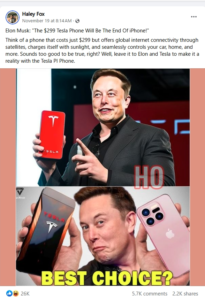Elon Musk Denies Tesla Smartphone Rumors, Sets Condition for Phone Production
On November 5, Elon Musk appeared as a guest on Joe Rogan’s podcast, where he discussed various topics, including video games, the Twitter acquisition, censorship, and free speech.
When asked about rumors that Tesla might produce smartphones, Musk immediately dismissed the idea: “No, we’re not making phones.” Despite acknowledging Tesla’s unique position to develop a phone that’s neither Android nor iPhone, he clarified, “It’s not something we want to do unless absolutely necessary.”
The only scenario Musk considers making a phone is if Apple and Google start censoring apps or act as “gatekeepers.” For now, Tesla is fully focused on electric vehicles, autonomous cars, and robots. Musk added that phone production would be a “headache.”
Musk’s stance on smartphone production has been unpredictable. He first mentioned it in November 2022, after acquiring Twitter (now X), amid concerns about the platform’s future on major app stores.
In June, during a livestream on X, Musk reiterated that Tesla would not make phones. However, two days later, on June 11, he hinted at the possibility of X collaborating with a smartphone brand to develop a custom open-source operating system, saying, “It’s not impossible.”
Later, he elaborated that Tesla could make phones but hopes it won’t be necessary.

Viral Fake News About “Tesla Phone”
Recently, a Facebook post by an account named Haley Fox claimed that Elon Musk announced a “$299 Tesla Phone” that would “end the iPhone.” The post suggested the phone would have satellite internet, solar charging, and the ability to control cars and homes. The post garnered over 26,000 interactions before being flagged as fake and removed by Meta, according to fact-checking organization PolitiFact.
PolitiFact clarified: “There is no evidence supporting the claim that Musk made such a statement. It hasn’t appeared in any credible news reports or public announcements from Musk or Tesla. No phone is listed on Tesla’s official website.”
PolitiFact partners with Meta and TikTok to combat misinformation. Under this partnership, Meta and TikTok flag potentially misleading posts, and PolitiFact verifies them, providing feedback on their accuracy. The final decision to remove or keep the posts lies with TikTok and Meta.